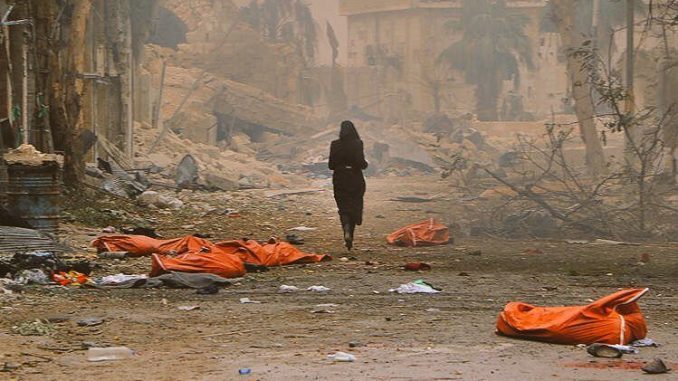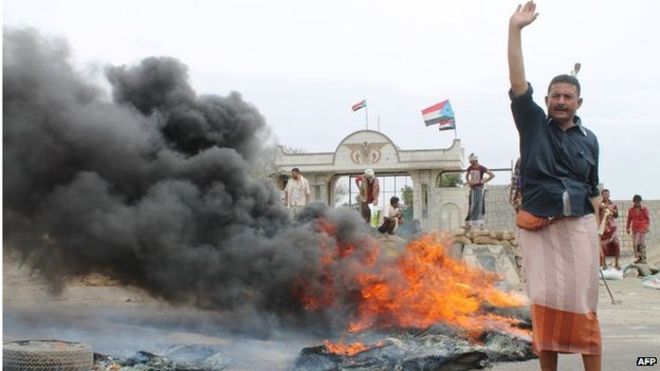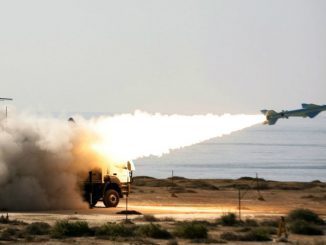
The recent battle in Aleppo hasn’t just cost the rebels two-thirds of their held areas, but also displaced more than 20.000 civilians and killed hundreds, while UN said that Aleppo became “one giant graveyard”.
Assad regime forces, backed by Russian air power, Iranian ground forces and Shi’ite militia fighters from Iran, Iraq, and Lebanon, started a major offensive to push opposition fighters out of the besieged eastern half of the city on 15 September.
Helicopters continue extensively dropping barrel bombs in conjunction with airstrikes by warplanes on areas in the eastern neighborhoods of the city, accompanied by artillery shelling by the regime forces in the same places.
The regime’s forces’ persistent and the intensive airstrikes forced the rebels to leave the areas they hold.
On Monday 28 November, government forces seized the Sakhur, Haydariya, and Sheikh Khodr districts, and Kurdish fighters took the Sheikh Fares neighborhood from rebels, the Syrian Observatory for Human Rights monitor said.
The regime’s forces’ persistent and the intensive airstrikes forced the rebels to leave the areas they hold.
On Monday 28 November, government forces seized the Sakhur, Haydariya, and Sheikh Khodr districts, and Kurdish fighters took the Sheikh Fares neighborhood from rebels, the Syrian Observatory for Human Rights monitor said.
“Every day there are a lot of attacks, helicopters dropping barrel bombs and war planes dropping bunker-buster bombs and cluster munitions,” Modar Shekho, an emergency nurse in al-Shaar neighborhood, told Al Jazeera.
“The revolutionaries are fighting fiercely but the volume of bombardments and the intensity of the battles, the dead and the wounded, and the lack of hospitals, are all playing a role in the collapse of these frontlines,” said a rebel official.
Military situation in #Aleppo. #SAA & Allies gains from November 25 to November 28. pic.twitter.com/aYZ3o4SkwI
— Military Advisor (@miladvisor) November 28, 2016
20.000 civilians have fled their homes
Around 20.000 thousands of civilians left their homes fleeing the extreme bombardment and the clashes in the eastern parts of Aleppo in the last days.
“The situation is disastrous,” added Ibrahim Abu Al-Leith.
“There is mass displacement and morale is in the gutter,” he said, his voice cracking with emotion.
“People are sleeping in the streets. They don’t have anything to eat or drink, but neither do we,” he told AFP.
“Intensified ground fighting and indiscriminate aerial bombardment over the past few days in eastern Aleppo city has reportedly killed and injured scores of civilians,” said UN humanitarian chief, Stephen O’Brien. “There are no functioning hospitals left, and official food stocks are practically finished.”
“With no end in sight to the fighting or indeed a wider peace being reached, thousands of more civilians face a daily struggle to survive,” said Marianne Gasser, head of the ICRC delegation in Syria.
“The needs are massive, and the ongoing fighting and insecurity make aid deliveries and repairs difficult,” she said
People had two hard choices as they were afraid to leave the area due to clashes and hunted by death also if thy stayed,
“We are so afraid. The army is about five to six kilometres away from us,” Marwa Taleb, resident of the al-Kallasseh neighbourhood in eastern Aleppo, told Al Jazeera.
“The exodus is extreme in every meaning of the word. Many from Hanano and Sakhour, where the army has advanced, are coming into neighborhoodsoods. There is so much anxiety and fear.”
Taleb said she and her family are apprehensive to move into areas under government control.
“We’re hearing different things. Some people are saying the men who leave are being killed, but the women are left alone. Others are saying they are safe in Jibreen. Some have left but we haven’t heard back from them.”
In #Aleppo you Have only 2 Choice:
Die while you are trying to survive
Die in the #Assad areas and lose your Dignity Agin
Aleppo today 🙁 pic.twitter.com/YJOrxdOMXJ— Ahmad Alkhatib (@AhmadAlkhtiib) November 30, 2016
20,000 left their homes in East #Aleppo in the last 48hours pic.twitter.com/fC6672FV2J
— Ahmad Alkhatib (@AhmadAlkhtiib) November 29, 2016
Daily massacres, hundreds died
“The shelling is not slowing down. There are people under the rubble. The situation is catastrophic,” Ibrahim al-Hajj, an activist from Aleppo said.
Assad regime forces stepped up the use of air strikes on Wednesday, including in Aleppo’s Old City, according to a rebel official.
Rescue workers in the rebel zone said renewed artillery bombardment had killed more than 45 people, mostly women and children, on Wednesday and injured dozens more, including some of those who had fled from frontline areas.
“Today there was another massacre, I witnessed it. The displaced people were coming at 6:30 am. There was artillery shelling while they were walking in the streets. Really, it was so, so horrible,” said Aref al-Aref, a nurse and photographer in a rebel-held part of the city.
Footage sent by the Civil Defense rescue operation, purportedly of the aftermath, showed people lying in the street in pools of blood, including a woman dressed in black who had been carrying a large backpack.
A network of activists across Syria, the Local Coordination Committees, said that a total of 150 Syrians were killed on the last three days in Aleppo by Assad regime and its allies, raising the total number to more than 500 since the offensive started.
“Please help us. We want anyone to intervene and stop this,” Hajj said.
Last call for passengers to #Paradise, Free entering, No #Visa, No #passport
No need your bags, Just Leave this ugly @Earth #Aleppo Today pic.twitter.com/B16V4FaGYh— Ahmad Alkhatib (@AhmadAlkhtiib) November 30, 2016
45 Civilians killed early this morning by #Assad shells while they're trying to flee from East to West besiege #Aleppo @SyriaCivilDef pic.twitter.com/DcSSFUAES5
— Ahmad Alkhatib (@AhmadAlkhtiib) November 30, 2016
One giant graveyard
The UN’s humanitarian chief has warned that eastern Aleppo was being turned into “one giant graveyard”.
Stephen O’Brien told an emergency session of the UN security council that since Saturday 25,000 people had been forced from their homes in eastern Aleppo, more than half of them children.
“For the sake of humanity, we call on, we plead, with the parties, and those with influence, to do everything in their power to protect civilians and enable access to the besieged part of eastern Aleppo before it becomes one giant graveyard,” O’Brien said.
O’Brien raised the alarm over the plight of civilians forced out of eastern Aleppo by the fighting, who first had to cross frontlines and then brave government checkpoints.
“As we have seen before, across Syria and throughout the conflict, men, women and children, have been routinely arrested at government-controlled checkpoints, before being transferred to one of dozens of official or secret government-run detention facilities,” he said. “They are often held incommunicado and indefinitely, facing the risk of being subjected to torture and ill-treatment, extrajudicial killings or being disappeared.”
The European envoys also condemned the offensive and asked to stop it, while not mentioning any real steps their countries are willing to do to make this happen.
Matthew Rycroft, the UK ambassador to the UN, pointed to UN figures that a million people are now living under siege across Syria, half of them children.
“Russia has vetoed time and again to prevent the security council from finding the unity necessary to end this war. And so I ask again Mr President, what will it take?” he said.
“Without a change in policy, without a change of heart, that’s exactly what this is – the slow, painful, bitter execution of a million Syrians, cut off from aid convoys, cut off from the world,” he said.
The French envoy, François Delattre, said the crushing of eastern Aleppo was not just a humanitarian calamity but also a strategic mistake.
“What is happening in Aleppo will only fuel chaos and terrorism. Not only is it not a way in our view to combat terrorism, but it is a mechanic way, automatic way, to fuel radicalisation and terrorism,” Delattre said.
While the Russian ambassador backed the offensive and his country’s intervention, giving a clear sign on the real way a global power defend its interests, with power and not empty words.
The Russian ambassador to the UN, Vitaly Churkin, rejected calls for an end to the offensive, which is being spearheaded on the ground by Lebanese Hezbollah and Iranian-led units, with Russian air support.
Churkin said Russia shared concern for the fate of the civilian population but argued their plight would not be eased by ceasing “counter-terrorist operations” against “bandits” that the UK and France had “coddled and fuelled”.
He called the White Helmet civil defence organisation, which digs people out of bombed buildings, a “pseudo-humanitarian” group, and said UN resolutions calling for an end to the bloodshed were “a pointless tactic”.
@SyriaCivilDef white hands helping what they can help from those who under the rubble #StandWithAleppo pic.twitter.com/bovgxIdnqm
— Ahmad Alkhatib (@AhmadAlkhtiib) November 29, 2016
51+ Were killed & 150+ were injured after #Aleppo city was targeted with 150+ Airstrikes & 1200+ artillery shells today.#StandWithAleppo pic.twitter.com/La4oJqGFFO
— The White Helmets (@SyriaCivilDef) November 29, 2016
Capturing eastern Aleppo would be the biggest victory for Assad regime since the start of the revolution against him in 2011, restoring his control over the whole city apart from a Kurdish-held area that has not fought against him.
It would also be seen as a victory for his allies, Russia and Iran, which have outmaneuvered the West and Assad’s regional enemies through direct military intervention.
For Assad regime, taking back Aleppo would make its forces focus on ending the remaining rebels-held areas. These areas include the rebels’ stronghold in Idlib in addition to isolated areas in rural Damascus, Homs, and Hama.
These areas have been under daily bombardment and crippling siege for years. The Old city of Homs and parts of rural Damascus has already been lost to Assad regime, and the remaining areas are expected to follow.
As a conclusion, defeating the rebels and retrieving Aleppo means destroying the last major resistance stronghold of the Syrian rebels and will lead eventually to the victory of Assad regime and ending the Syrian revolution.



